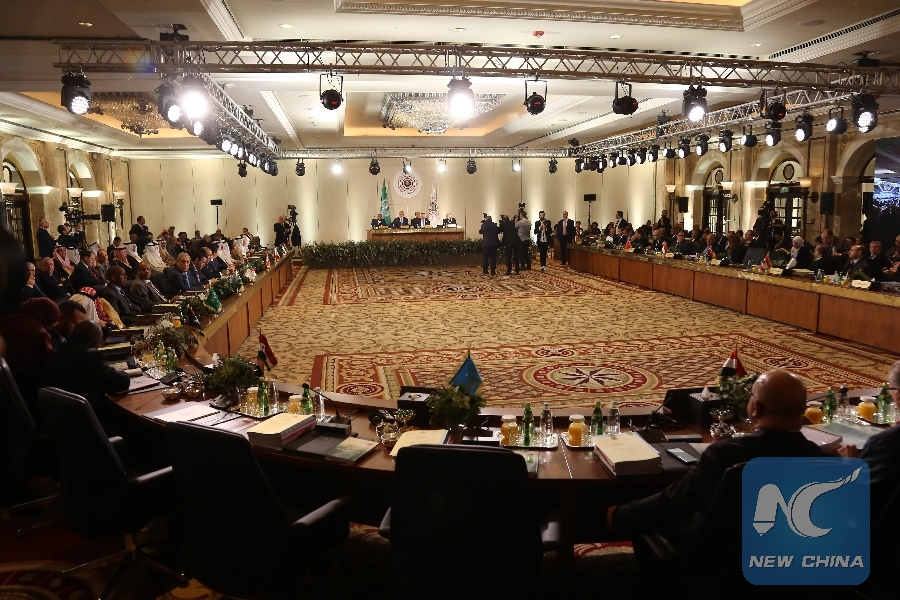
Arab foreign ministers attend a preparatory meeting of the Arab Economic and Social Development Summit in Beirut, Lebanon, on Jan. 18, 2019. (Xinhua/Bilal Jawich)
BEIRUT, Jan. 19 (Xinhua) -- Despite Syria' absence at the Arab Economic and Social Development Summit held in Beirut by the Arab League (AL), the debate over normalizing the pan-Arab body's ties with Syria cast a shadow over the gathering.
Ahead of the Jan. 19-20 summit, Lebanese Foreign Minister Gebran Bassil openly called on AL to re-admit Syria, whose membership was suspended in November 2011 due to the rising casualties in the violent clashes during anti-government protests in Syria.
"Syria is the most notable absentee at our conference," Bassil said on Friday, adding that Arab states shouldn't wait for "a permission" for Syria's return.
Bassil has reportedly been lobbying among member states to invite Syria to the summit, but the final decision was put off until the AL summit due to be held in Tunisia in March.
In a sign of deep division among Arab countries over the Syria issue, seven Arab leaders who were originally expected to attend the meeting failed to show up.
Some Lebanese political experts believe that U.S. pressures are likely behind the delay of Syria's re-admission to the AL.
"The United States has lately put pressures on Arab countries to freeze their plans to re-open their embassies in Syria and to halt their talks about rebuilding the country," Rafic Nasrallah, director of the Lebanese International Center for Media and Research, told Xinhua.
He added that the recent tour by U.S. Secretary of State Mike Pompeo to the Middle East, which included Jordan, Iraq, Egypt, Bahrain, the United Arab Emirates (UAE), Saudi Arabia, Oman and Qatar, was meant to rally anti-Iran allies and reject Syria's re-admission to the AL.
"Washington exerts regional pressures to force Iran out of Syria and it also has concerns about the activities of Lebanese Iran-backed Hezbollah in the region. This is why the United States hasn't given the green light for the return of Syria to the AL," said Nasrallah.
In mid-December last year, Sudanese President Omar al-Bashir made the first visit by an Arab leader to Damascus since the eruption of Syria's civil war. Later in the same month, the UAE re-opened its embassy in Syria and Bahrain officially announced to follow suit.
However, AL chief Ahmed Aboul-Gheit said on Thursday that AL member states have not reached a consensus on Syria's return to the 22-member body.
Egyptian Foreign Minister Sameh Shoukry also said last week that Damascus needs to take a number of measures toward a political settlement to the Syrian crisis in order to restore its AL membership.
"Circumstances today do not seem to be favorable for Syria's return to the AL despite the willingness shown by some Arab countries," said Nasrallah.
Qatar's Foreign Minister Mohammed bin Abdulrahman Al-Thani announced a few days before the Arab economic summit in Beirut that Doha sees no need to re-open its embassy in Damascus, as there are no "encouraging" signs to normalize ties with the Syrian government.
Meanwhile, Lebanese Parliament's Deputy Speaker Elie Ferzli told Xinhua that Syria will most probably return to the AL during the 30th session of the Arab Summit in Tunisia.
Ferzli attributed the possibility of Syria's return to AL to the willingness of some Gulf states to re-open their embassies in Damascus in a bid to prevent Turkey from expanding its influence in the war-torn country.
As the U.S. prepares to pull its troops out of Syria, Turkey has threatened to launch a cross-border operation inside Syria to clear the Kurdish group People's Protection Units (YPG) of northeastern Syria.
"Gulf countries aim to pull the rug from under Turkey by resuming ties with Syria," said Ferzli, noting that Lebanon will be able to normalize its ties with Syria if the latter returns to the AL.
"We can see that most of Lebanese want to open up to Syria and take part in the country's reconstruction, and this can be done after Syria's re-admission," he said.
Sami Nader, director of the Levant Institute for Strategic Affairs in Lebanon, believes that Lebanon seeks to normalize ties with Syria without derailing its relations with the AL.
"While Lebanon is interested in normalizing its ties with Syria, it is more interested in forging a decent relationship with the AL," Nader said. "Lebanon cannot make the decision unilaterally without a nod from the AL, whose decision should come first."

